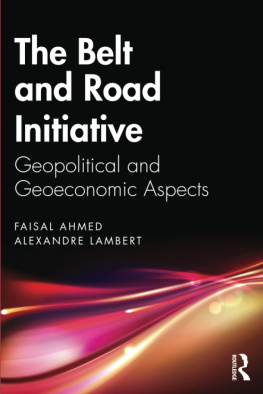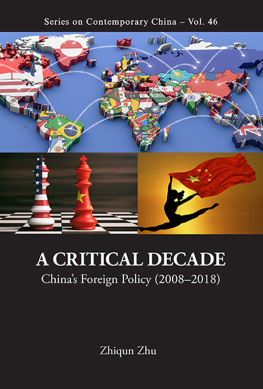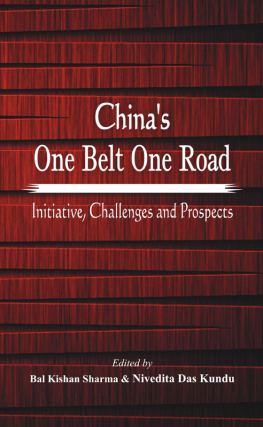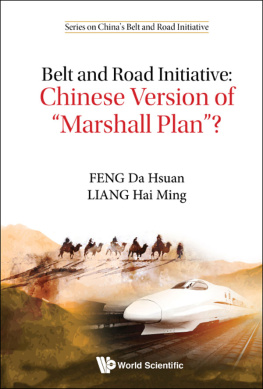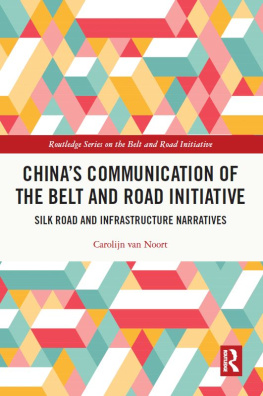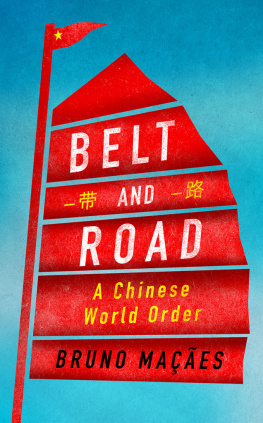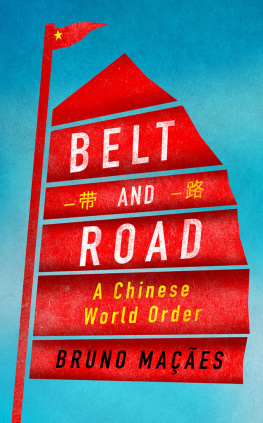THE BELT AND ROAD INITIATIVE
This book studies the geopolitical and geoeconomic aspects of Chinas Belt and Road Initiative (BRI). It argues that the BRI has the potential to redesign the spatial and territorial dimensions of governance and effectively counterbalance the hitherto predominant hegemonies of the Anglo-American sea power.
The volume:
- Highlights the main geopolitical patterns, including geographical, economic, financial, technological, and strategic factors guiding the BRI on a global scale
- Presents a historical account of the development of the Silk Road and underlines its contemporary relevance
- Traces Chinas growing influence from Eurasia to America
- Discusses how the Initiative is likely to transform international relations by the middle of the 21st century.
A comprehensive guide to Chinas rise as the new centre of gravity in global geopolitics, the book will be indispensable for students of political studies, geopolitics, international relations, and foreign policy. It will also be useful for policymakers, strategic investors, think tanks, and government officials.
Faisal Ahmed is a Professor in the International Business Area teaching trade and geopolitics at FORE School of Management, New Delhi, India. In addition to a PhD and masters from India, he holds an Executive Certification in geopolitical analysis from Geneva. His research and consulting interests include Indo-Pacific region, Chinas trade and geopolitics, ocean diplomacy, trade agreements, and sustainable development goals. He had been consultant to the United Nations Economic and Social Commission for Western Asia and other organisations. He has also worked on projects supported by the Ministry of Commerce and Industry, Government of India. He has published papers in refereed journals, and also frequently publishes in popular media. He is the author of the textbook Business Environment: Indian and Global Perspective (2014). He has also published two edited books on India-ASEAN Engagements, and Indias Foreign Policy in WANA region. Also, he has published three monographs on grassroots reach of Indias foreign trade policy, Indias experiences in PTAs, and EEZ and the UN Convention on the Law of the Sea. His articles have appeared in The Hindu Business Line, South China Morning Post, The Economic Times, Business Standard, The Financial Express, China Radio International, The Korea Times, and The Straits Times, among others. He is frequently interviewed as an expert by national and international media.
Alexandre Lambert is Academic Director of the Geneva Institute of Geopolitical Studies (GIGS), Switzerland. He is also Director of a SIT Study Abroad University Program on Global Health and Development Policy in Switzerland and teaches international relations, with focus on international security at the Geneva School of Diplomacy and International Relations (GSD) and Webster University, Geneva. Formerly, he was a civil servant at the Swiss Federal Department of Defence within its security policy division and became a founding fellow of the Geneva Centre for Security Sector Governance (DCAF). He holds a PhD from the Graduate Institute of International and Development Studies in Geneva, where he was also lead researcher on the OSCE, to which he has been providing independent policy advise for almost two decades and with special emphasis on the Code of Conduct on Politico-Military Aspects of Security. He has mainly published in the fields of international security, civil-military relations, and geopolitics.
THE BELT AND ROAD INITIATIVE
Geopolitical and Geoeconomic Aspects
Faisal Ahmed and Alexandre Lambert
First published 2022
by Routledge
2 Park Square, Milton Park, Abingdon, Oxon OX14 4RN
and by Routledge
605 Third Avenue, New York, NY 10158
Routledge is an imprint of the Taylor & Francis Group, an informa business
2022 Faisal Ahmed and Alexandre Lambert
The right of Faisal Ahmed and Alexandre Lambert to be identified as authors of this work has been asserted in accordance with sections 77 and 78 of the Copyright, Designs and Patents Act 1988.
All rights reserved. No part of this book may be reprinted or reproduced or utilised in any form or by any electronic, mechanical, or other means, now known or hereafter invented, including photocopying and recording, or in any information storage or retrieval system, without permission in writing from the publishers.
Trademark notice: Product or corporate names may be trademarks or registered trademarks, and are used only for identification and explanation without intent to infringe.
British Library Cataloguing-in-Publication Data
A catalogue record for this book is available from the British Library
Library of Congress Cataloging-in-Publication Data
Names: Ahmed, Faisal (Professor of international business), author. | Lambert, Alexander, author.
Title: The Belt and Road Initiative : geopolitical and geoeconomic aspects/Faisal Ahmed and Alexandre Lambert.
Description: Abingdon, Oxon; New York, NY: Routledge, 2022. | Includes bibliographical references and index. |
Identifiers: LCCN 2021030001 (print) | LCCN 2021030002 (ebook) | ISBN 9781032009551 (hardback) | ISBN 9781032154497 (paperback) | ISBN 9781003244219 (ebook)
Subjects: LCSH: Yi dai yi lu (Initiative: China) | Economic developmentChina. | Silk RoadHistory. | ChinaCommercial policy. | ChinaForeign economic relations.
Classification: LCC HF1604 .A54 2022 (print) | LCC HF1604 (ebook) |DDC 330.951dc23
LC record available at https://lccn.loc.gov/2021030001
LC ebook record available at https://lccn.loc.gov/2021030002
ISBN: 978-1-032-00955-1 (hbk)
ISBN: 978-1-032-15449-7 (pbk)
ISBN: 978-1-003-24421-9 (ebk)
DOI: 10.4324/9781003244219
Typeset in Bembo
by Deanta Global Publishing Services, Chennai, India
Contents
THE ANCIENT SILK ROADS
DOI: 10.4324/9781003244219-1
The Portuguese explorer Ferdinand Magellan (1480-1521) navigated from the Atlantic to the Pacific Ocean herewith realising the effective circumnavigation of the Earth. His expedition of 1518-1522 would be called the Eastern Indies. Within the cultural and linguistic heritage of the Western civilisation, if people say that they orient themselves, it effectively resonates thousands of years of looking-to-the-East. This implies that before Columbus and Magellan, nobody in Europe would look to its West, as the Atlantic Ocean would be considered the utmost edge of the old world and within pre-modern world maps, respectively. Thus, before the discovery of the Americas and therewith along much of civilisational evolution, Eurasia kept being the core of both world politics and economic globalisation. And within the continental complex of the so-called World Island encompassing Eurasia and Africa, the Ancient Silk Roads and Routes (ASRs) would serve as the commercial connectivity grid and also super-highway of communication and cultural exchanges, along which the foundations of modernity would be developed. For the past two centuries, North Atlantic has been the centre of the world. It has shaped the first two global sea superpowers, the British Empire and Commonwealth, and the United States. It seems as if the 21st century will be shaped again from within Asia with the two giants, China and India, rejuvenating to lead the world. And since this will also coincide with the return of Asian values, a new generation of global leadership is emerging, built on an Asian variation of economic statecraft shaped by both responsibility and solidarity. In the words of Khanna:

